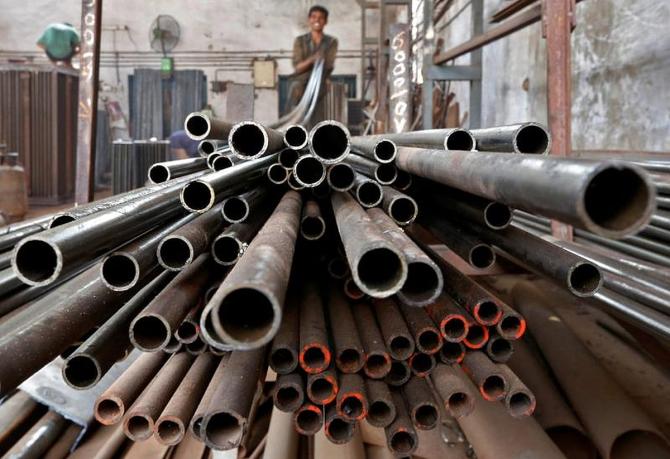Most analysts have downgraded JSPL, JSW Steel, Tata Steel, SAIL, and NMDC.

The imposition of 15 per cent export duty on steel has suddenly altered the prospects of the sector to negative and led to a big sell-off in steel stocks.
Iron ore and pellet exports have to face duties of 45-50 per cent, which means they become uncompetitive.
The Ukraine war has led to a supply crunch in global markets and pushed up prices, with Europe, in particular, looking for replacements for Ukrainian and Russian exports.
At the same time, raw material costs and supply-chain difficulties have been sparked off due to record coal prices and tightness in the ore market.
The China slowdown also means weakness in global demand — China has seen a drop of 7 per cent in volumes year-on-year (YoY) over January-April 2022.
Indian exporters ship out around 15-20 per cent of their production, but there’s a large variation in export exposure between companies.
Jindal Steel & Power (JSPL), JSW Steel, Tata Steel, and Steel Authority of India (SAIL) export 30 per cent, 25 per cent, 15 per cent, and 10 per cent, respectively.
If global demand remains strong, exporters may still be able to maintain export volumes and pass on the duty.
However, global demand will, to a large extent, be dependent on China revival and if China revives, there are chances the export duty will be maintained indefinitely.
It’s notable that domestic steel prices are also likely to fall due to export duty because domestic supply will rise.
Given extreme volatility in global demand and substantial dependence on exports, most analysts have downgraded the sector and stocks.
In 2021-22, India exported 13.5 million tonnes (mt) of steel, YoY growth of 26 per cent over the previous fiscal year’s volumes of 10.5 mt exports.
This is around 12 per cent of India’s total finished steel output.
The value of exports increased 115 per cent YoY to $13.27 billion — the per-tonne rise in realisation was 75 per cent, to $900.
Given 15 per cent duty, this would imply additional cost of $135 per tonne on exports.
Domestic steel prices have fallen 10-12 per cent since April, as global prices have also eased by around 20-30 per cent from the 52-week highs.
Domestic hot-rolled coil prices are on a par with landed cost of imports at Rs 69,000 per tonne ($890).
In spite of the duty, steel companies will probably try to push export share due to insufficient domestic demand, market opportunities in Europe, etc.
The withdrawal of import duties on coking coal may allow producers to reduce domestic prices somewhat, while keeping margins.
Lower domestic prices could, however, stimulate demand from infrastructure, housing, and the automotive sectors.
It will lead to capital expenditure plans by steel producers being put on hold for now.
Given lower earnings and assuming unchanged valuation multiples, the fair value for steel producers is expected to reduce by at least 25 per cent.
Most analysts have downgraded JSPL, JSW Steel, Tata Steel, SAIL, and NMDC.
Last month saw the Nifty Metal Index fall 20 per cent, with an 8 per cent drop on Monday.
JSPL, JSW Steel, Tata Steel, and SAIL all lost more than the index (which includes other industrials).












 © 2025
© 2025